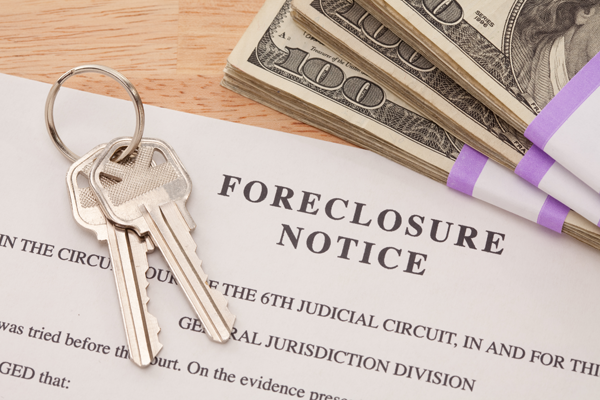
Estate Planning Home
November 20, 2019
Collections in Ohio
November 20, 2019
Foreclosure in Ohio
Foreclosure in Ohio is the process whereby a mortgagor is able to reclaim possession of a debtor’s home when said debtor fails to make his or her mortgage payments in a timely fashion. Simply missing a payment or two is not sufficient to give creditors this right. Instead, a court must be satisfied that the mortgagor has complied with the foreclosure process laid out in Ohio’s statutes before the court will grant a foreclosure.
Overview of Ohio’s Foreclosure Process
Creditors do not foreclose on properties until there has been some “breach,” or violation, of the mortgage agreement by the debtor. Most often, the breach that leads to foreclosure is the debtor’s failure to make timely payments on the mortgage note. From there, the process generally pro
ceeds as follows:- The creditor prepares a foreclosure petition and summons and has these documents served (that is, delivered) to the debtor(s). The petition must set forth the existence of the mortgage agreement as well as facts demonstrating how the debtor violated the terms of the agreement.
- The debtor then has 28 days to respond, although more time may be granted to permit the debtor to answer the petition. The debtor may raise any defenses he or she may have in his or her answer. For example, if the creditor alleges that the debtor has not made payments on the note, the debtor may allege that payments have, in fact, been made.
- If the debtor files no answer, then the creditor may ask for a default judgment after the 28-day response window has passed. Otherwise, if there is a legitimate question as to whether the debtor has breached the agreement, then a hearing will be set and the court will make a determination as to whether the debtor did breach the mortgage agreement.
- If a default judgment is entered, or if the court finds that the debtor has breached the mortgage agreement, a sheriff’s sale is held. At the sheriff’s sale, the debtor’s home will be placed up for auction and sold to the highest bidder.
- Once the sale has taken place, the sheriff must file a notice that the sale has been held with the court within 60 days of the date of sale and the court must confirm the sale within 30 days thereafter. During this period, the debtor may still “redeem” the property and remove it from foreclosure by paying off the amount he or she owes plus fees and other costs that have accrued up to that point.
Potential Pitfalls in Ohio Foreclosures
At Walker Novack Legal Group, LLC, we recognize that ensuring the debtor(s) is properly served can be challenging, especially if the creditor suspects that the debtor is attempting to avoid service. Not only this, but certain service members may be entitled to additional notice or time to respond to a foreclosure proceeding. Improper or insufficient documentary evidence showing the existence of the note and demonstrating how the debtor has violated the note can also result in a delay in obtaining a foreclosure.
Help for Creditors in Foreclosure Proceedings in Ohio
Walker Novack Legal Group represents Ohio creditors and mortgagors in foreclosure proceedings. Our firm, which you can reach by calling (614) 423-8276, helps prepare and prosecute our clients’ foreclosure proceedings from start to finish. Learn more about our experience and approach in these types of cases by contacting our office now to meet with one of our seasoned creditor’s rights attorneys.
Walker Novack Legal Group, LLC
5013 Pine Creek Drive
Westerville, Ohio 43081
P: (614) 423-8276
F: (614) 767-0695

